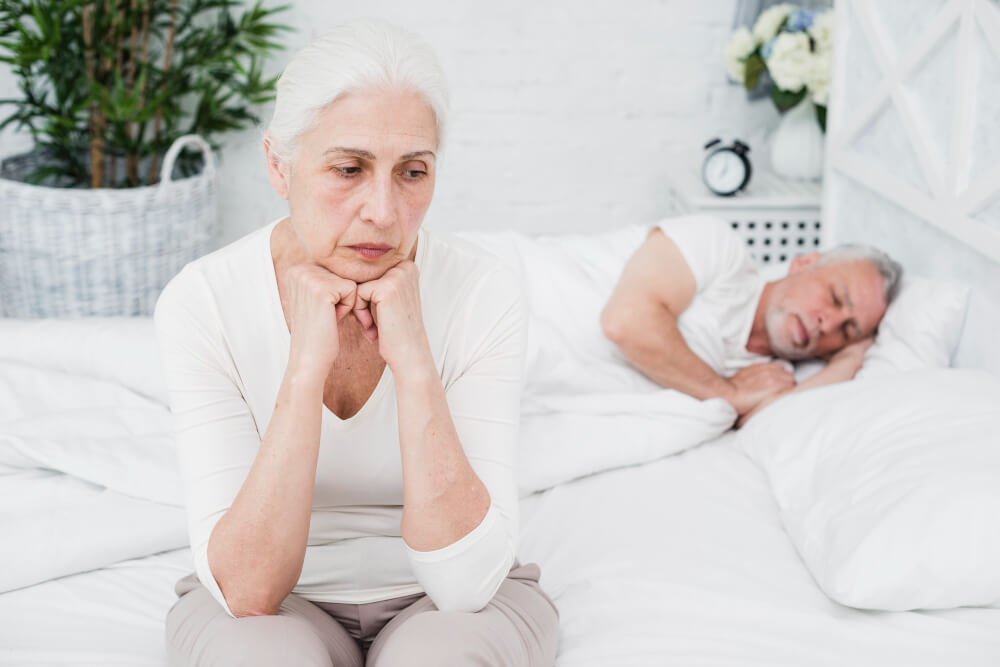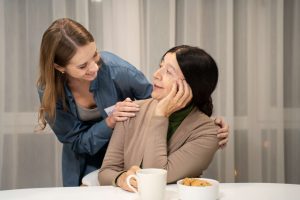As we age, our sleep patterns undergo natural changes. According to a study, approximately 10-15% of adults suffer from insomnia. What’s more concerning is the fact that older adults are more prone to insomnia when compared to the younger population. In the elderly, the prevalence of insomnia symptoms ranges from 30% to 48%, which might lead to an increased need for senior care.
It’s essential to understand these changes and address any underlying problems that may contribute to sleep disturbances and, in the long term, may also result in insomnia. In this article, we’ll explore the top five causes of insomnia in older adults and provide proven insomnia treatments to help your loved ones enjoy a more restful night’s sleep.
Understanding Sleep Changes in Aging
Experts acknowledge that aging brings about alterations in sleep patterns. Older adults often find themselves becoming drowsy earlier in the evening and experiencing shallower sleep than in their youth. While these changes are part of the aging process, it’s crucial to recognize that aging alone isn’t the sole contributor to sleep difficulties.
Sleep Problems Due to Underlying Medical Conditions
Many older adults suffer from secondary sleep problems like insomnia resulting from underlying medical conditions and the need for senior care. These conditions can disrupt sleep and include:
- Conditions of the heart and lungs: Heart failure and chronic obstructive pulmonary disease might interfere with breathing, which can impair sleep.
- Gastroesophageal Reflux Disease (GERD): GERD is a condition that causes heartburn symptoms and can be made worse by late-night, hefty meals, which will also affect your ability to sleep.
- Painful Conditions: Finding a comfortable sleeping posture can be difficult if you have osteoarthritis or another painful disease.
- Urinary Issues: Prostate enlargement or an overactive bladder can cause frequent overnight urination, which can interfere with sleep.
- Mood disorders: Anxiety and depression are prevalent in older persons and can make it difficult to fall asleep.
- Neurodegenerative Disorders: Sleep patterns can be disturbed by diseases like Alzheimer’s and Parkinson’s.
- Medication Side Effects: Some prescription and over-the-counter medicines have the potential to cause insomnia.
Taking the first step towards improving the quality of your sleep involves addressing underlying health worries and knowing when it is time for Dementia care. It is advised to get in touch with a healthcare professional to identify and effectively manage these conditions.
Sleep-Related Breathing Disorders
Sleep Apnea: Sleep apnea, a commonly encountered condition,
entails frequent interruptions in breathing during sleep. The most frequent form is obstructive sleep apnea (OSA), often accompanied by snoring. Less common is central sleep apnea, which is associated with changes in brain function.
As one age, especially among those who are overweight, the likelihood of experiencing sleep-related breathing disorders increases. If left unaddressed, sleep apnea can give rise to severe complications, like stroke and heart disease. If you suspect you may have sleep apnea, it is advisable to undergo evaluation through polysomnography (sleep testing) either at a sleep lab or by using a home testing kit.
Restless Leg Syndrome (RLS)
The symptoms of restless leg syndrome include itching, crawling, or agitation in the legs while attempting to fall asleep. Although the precise reason is still unclear, dopamine and iron levels in the brain seem to be involved. With 5–15% of the general population fitting the criteria for RLS, it is a very prevalent condition.
Anxiety, depression, and sleep-onset insomnia may all be related to RLS. Check your iron levels and see a doctor if you think you may have RLS. There are pharmacological and non-pharmacological therapeutic alternatives.
Periodic Limb Movements of Sleep (PLMS)
PLMS refers to the occurrence of occasional limb movements during sleep, primarily affecting the lower limbs. These movements may occasionally prove bothersome to sleeping partners but do not necessarily result in awakening for the individual experiencing them. Although prevalent among older adults, PLMS is frequently linked to other sleep-related issues.
Insomnia
Insomnia is a frequent sleep disorder that affects 23-24% of middle-aged and older persons. It can cause impairment throughout the daytime and entails trouble falling or staying asleep. Anxiety, sadness, memory loss, and other long-term health problems are all associated with insomnia.
Proven Ways to Treat Insomnia in Elderlies
Before considering sedatives or medications, it’s essential to explore non-pharmacological senior care approaches. Many medications can negatively affect brain function and worsen balance, making them unsuitable for older adults.
Cognitive-Behavioral Therapy for Insomnia (CBT-I)
CBT-I involves therapy to address negative thought patterns contributing to insomnia. It also promotes sleep-boosting habits and relaxation techniques. CBT-I has a strong track record in research and can be delivered in person or through online programs.
Brief Behavioral Treatment of Insomnia (BBTI)
BBTI is a shorter variant of CBT-I designed to be completed in four weeks. It has demonstrated effectiveness in reducing nighttime urination.
Mindfulness Meditation
Studies have proven that mindfulness meditation can help in improving sleep in older adults with various sleep disturbances. Local courses and smartphone apps can help individuals learn mindfulness techniques.
Exercise
Participating in physical activities plays a crucial role in promoting overall well-being. However, its direct impact on improving the quality of sleep may appear somewhat restrained. Nonetheless, it can offer benefits when combined with complementary therapeutic approaches.
Medications and Supplements
Melatonin: Melatonin, a hormone intricately linked to our sleep-wake cycle, has shown its ability to improve the quality of sleep for older individuals. However, its effectiveness in the United States may vary due to differences in product quality.
Ramelteon: This synthetic pharmaceutical compound mimics the effects of melatonin and holds promise in enhancing sleep patterns without affecting balance or cognitive abilities.
Trazodone: Trazodone is a less risky antidepressant often prescribed as a sleep aid for older adults. It lacks anticholinergic properties and seems to provide a higher level of safety compared to other medicinal options.
If you are in search of a reputable memory senior care center for seniors, you can visit Oakdale Heights. Here, you will find the best assisted living community in California where we care for your loved ones with love and attention.
Wrapping It Up!
It’s crucial to understand the exact causes of sleep disturbances in older individuals to enable effective intervention and memory senior care. Before considering medication, one should explore non-pharmacological approaches like Cognitive Behavioral Therapy for Insomnia (CBT-I) and mindfulness meditation. It’s important to remember that sedative substances and certain over-the-counter medications can be harmful, especially for the elderly. Therefore, it is advised to seek the advice of a healthcare professional to choose the best course of action that takes into account unique circumstances.





